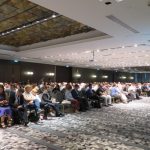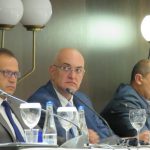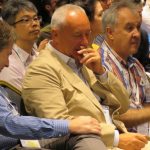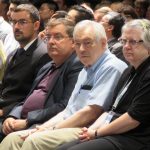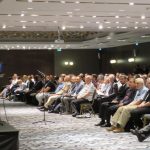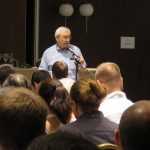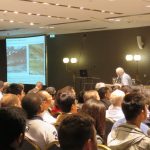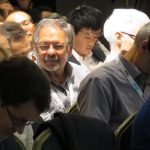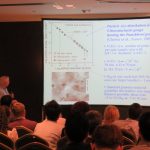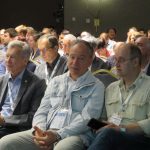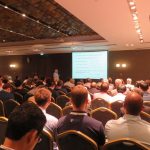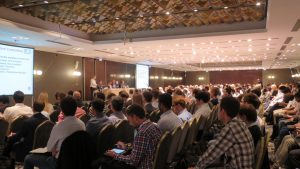 The problems of fracture mechanics and structural integrity were the central topic of the 22. European Conference on Fracture, which takes place in Belgrade, from 27th to 31st of August this year. More than 500 participants from all over the world will consider the most important aspects of this field of mechanics, which studies problems related to cracks and their effects on the behaviour of materials and structures. The conference was organised by the Structural Integrity and Life Society “Prof. dr Stojan Sedmak”, in cooperation with the European Structural Integrity Society (ESIS).
The problems of fracture mechanics and structural integrity were the central topic of the 22. European Conference on Fracture, which takes place in Belgrade, from 27th to 31st of August this year. More than 500 participants from all over the world will consider the most important aspects of this field of mechanics, which studies problems related to cracks and their effects on the behaviour of materials and structures. The conference was organised by the Structural Integrity and Life Society “Prof. dr Stojan Sedmak”, in cooperation with the European Structural Integrity Society (ESIS).
This conference on fracture, the first to be held in Serbia after 26 years, was officially opened on Monday, August 27th at the Metropol Hotel in Belgrade. The conference opening was attended by the representative of relevant ministries within the Government of the Republic of Serbia, as well as the representatives of the University of Belgrade, the scientific and industrial community and many other respected guests from our country and abroad.
On behalf of the Ministry of education, science and technological development of Republic of Serbia, the guests were greeted by the State Secretary, prof. dr Viktor Nedović, who took the opportunity to point out the importance of this conference not only for Serbia, but also for the region as a whole. On behalf of the Faculty of Mechanical Engineering of University of Belgrade, the guests were greeted by prof. dr Nenad Zrnić, the newly elected rector for international scientific cooperation of the University of Belgrade, and the vice-dean of international cooperation at the Faculty of Mechanical Engineering. The guests were also addressed by the conference chairman, prof. dr Aleksandar Sedmak, who is also the president of the Structural Integrity and Life Society “Prof. dr Stojan Sedmak”, and prof. dr Leslie Banks-Sills, the president of ESIS.
The work section of the conference was opened by a lecture held by prof. dr James Rice, a world-leading expert who formulated one the most important parameters in fracture mechanics, the J-Integral, 50 years ago. Prof. Rice teaches engineering sciences and geophysics at the Harvard University, and has been involved in geomechanical studies (glaciers, earthquakes…) for the past few decades. His lecture on this subject attracted major attention from the conference participants.
The first day of the conference was marked by two additional lectures. Prof. dr Jovo Jarić, a Serbian representative, spoke about the topic of “Conservation laws of the J Integral type”, whereas his colleague from Croatia, prof. dr Dražan Kozak held a lecture titled “Integrity of the pipeline by using the pipe-ring testing, part 1”.
On the second day, the plenary lectures were held by prof. dr Yoshi Hong from China, on the topic of “The State of the Art in Very-High-Cycle Fatigue Research”, professor Uwe Zerbst on the topic of “Application of fracture mechanics to S-N curve prediction”, professor Meinhard Kuna on the topic of “Micromechanical modeling of fracture in metallic materials”, and professor Nenad Gubeljak from Slovenia, who presented a lecture named “Integrity of pipeline by using pipe-ring testing, Part 2”.
The latest results and scientific breakthroughs in the field of fracture mechanics and structural integrity will be the focus of the conference in the following days. “Soft Network Composite Materials with Deterministic and Bio-Inspired Designs” was the subject of a lecture held by prof. Yonggang Huang from the USA. His compatriot, prof. Robert Ritchie will speak about the “Damage tolerance in Biological and Metallic Materials”. The subject that will be presented by prof. William Curtin from Switzerland is “Mechanisms of Hydrogen Embrittlement: Insights from Atomistic Studies”, whereas prof. Takayuki Kitamura from Japana will speak about the “Challenge toward Nanometer Scale Fracture Mechanics”.
Mini-symposia involving the fracture mechanics topics which are currently of most interest, above all related to hydrogen embrittlement, which represents the most significant problem related to corrosion failure, will be organised as a part of the conference.
The organisation of the 22nd European Conference on Fracture was financially supported by the Ministry of education, science and technological development of Republic of Serbia, EPS and other sponsors (Rumul, Messer and Sobriety), and significant support was provided by the Faculty of Mechanical Engineering of University of Belgrade, which co-organised the Summer School of fracture mechanics.

